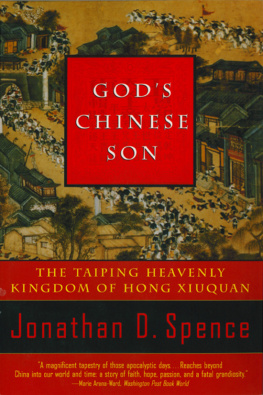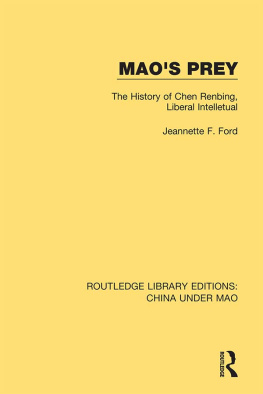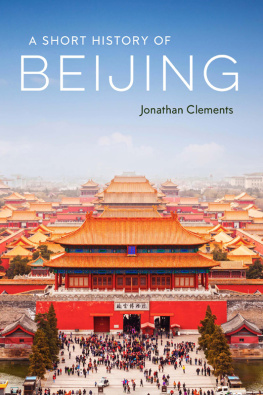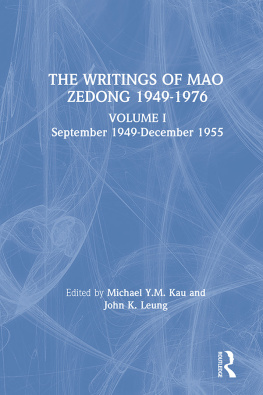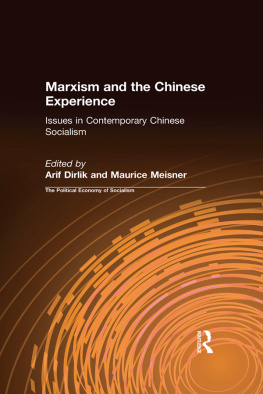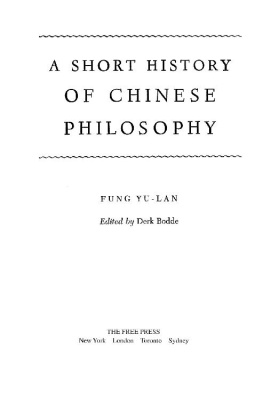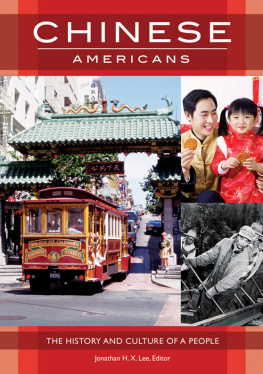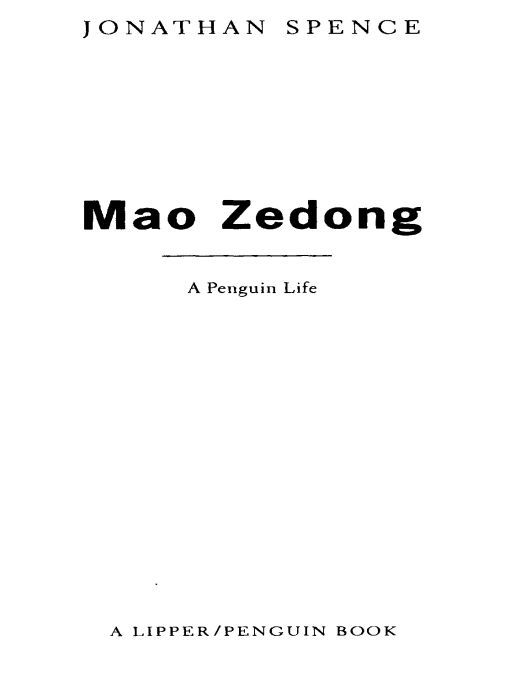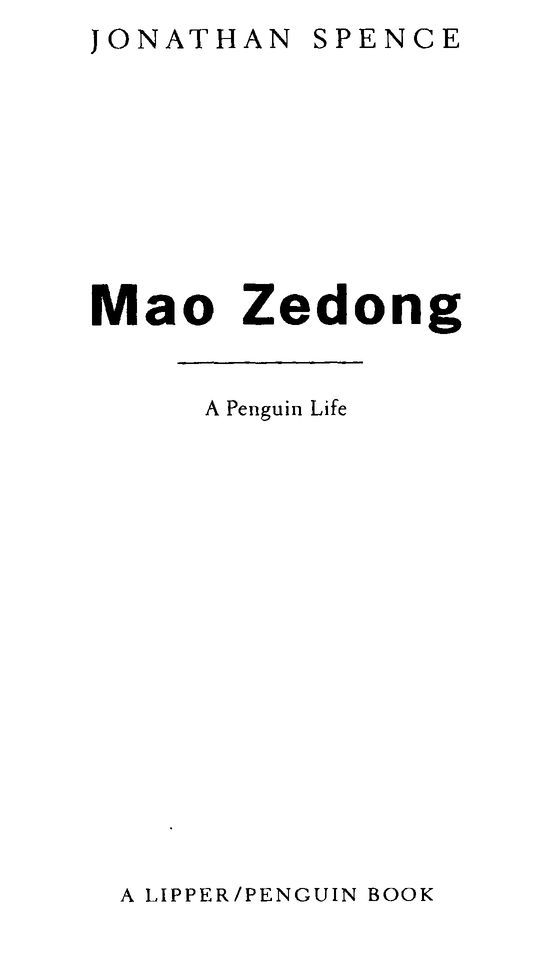Table of Contents
Praise for Mao Zedong by Jonathan Spence
Robust ... this is an intelligent, adroitly presented, informative overview of the historical figure known for orchestrated political purges and the unorchestrated terrors of the Cultural Revolution. It provides a balanced view written with the sure hand of the knowledgeable historian. Book
The task of bringing Mao to a large, non-specialist audience is one for which Spence is eminently well-suited. His lucidly written, com pellingly narrated explorations of modern Chinese history have attracted a readership unmatched by that of any other academic China specialist. His study of Mao is short ... his writing tight, his judgments restrained. The Washington Post
An elegant account, at once sparse and robust. The Economist
Spence ... compresses Maos story into a read-on-a-plane format, a task he accomplishes without sacrificing his academic rigor.
The New York Times Book Review
An exceptionally successful contribution to Penguins series of brief biographies.The New Yorker
Simple but to the point.... Spence ... draws upon his extensive knowledge of Chinese politics and culture to create an illuminating picture of Mao.... Superb. Chicago Tribune
Jonathan Spence [is] a eloquent chronicler of Chinese history.... [A] brisk, elegant book.... Spence skillfully uses Maos letters and poems to explore the Chinese leaders thinking and relationships.USA Today
There is no better person to write a general, readable account of Mao than Spence, an acclaimed Chinese historian and author of several biographies. Library Journal (starred review)
Fluid and informative despite its brevity. Publishers Weekly
Spence is the best known and most talented historian of China writing in English today.... His Mao Zedong succeeds. Los Angeles Times
ABOUT THE AUTHOR
Jonathan Spences eleven books on Chinese history include The Gate of Heavenly Peace and The Death of Woman Wang. He teaches at Yale University. His awards include a Guggenheim and a MacArthur Fellowship.
For Annping
Kings ought never to be seen upon the stage. In the abstract, they are very disagreeable characters: it is only while living that they are the best of kings.... Seen as they were, their power and their pretensions look monstrous and ridiculous.
William Hazlitt, Characters of Shakespears Plays
FOREWORD
MAOS BEGINNINGS were commonplace, his education episodic, his talents unexceptional: yet he possessed a relentless energy and a ruthless self-confidence that led him to become one of the worlds most powerful rulers. He was one of the toughest and strangest in Chinas long tradition of formidable rulers who wielded extraordinary powers neither wisely nor well, and yet were able to silence effective criticism for years or even decades by the force of their own character and the strength of their acolytes and guards. Mao need not have done what he did, and it was he alone who ensured that his visions of social and economic change became hopelessly enmeshed with violence and fear. It was his rhetoric and his inflexible will that led to the mobilization of hundreds of millions of Chinese citizens, whoeven when they wished tocould find no way to halt the cataract of energy swirling around them.
Those who endured Maos worst abuses execrate his memory. Those who benefited from his policies and his dreams sometimes still revere him, or at least remember the forces that he generated with a kind of astonished awe. In the end it was really only physical decay and weakness that brought him down, even though his chosen policies had long been shown to be full of inconsistencies and what Mao himself termed contradictions.
One goal of this book is to show how Mao was able to rise so high, and sustain his eccentric flight for quite so long. Context was naturally intrinsic to the drama, and the narrative tries to introduce the essential background that any reader needs to make sense of Maos life. Historians in China and the West are slowly hauling Mao back down to earth, deflating the myths that sustained him, even as they often exclaim over the patience and deliberation with which Mao and his confidants constructed those same myths. We are learning more about Maos relations with his family, friends, and confidential assistants; and Maos own youthful writings, his poems, original drafts of several key speeches, and a good many surviving personal letters help us get some way into his mind. But many of the wilder flights of Maos fancy, and the remarkable efforts he expended to attain them, take the historian out into a different zone, where the well-tried tools of exploration are of only limited help.
I have come to think of the enigmatic arena in which Mao seemed most at home as being that of orders opposite, the world of misrule. In the European Middle Ages it was customary for great households to choose a Lord of Misrule. The person chosen was expected to preside over the revels that briefly reversed or parodied the conventional social and economic hierarchies. The most favored time for the lords misrule was during the twelve days of Christmas, but they might preside, too, at other festivals or saints days. When the brief reign of misrule was over, the customary order of things would be restored: the Lords of Misrule would go back to their menial occupations, while their social superiors resumed their wonted status.
In the European examples with which we are familiar, the period of misrule was expected to be strictly limited, and the intention of the entire exercise was lighthearted. But sometimes the idea of Lord of Misrule would spill over from the realm of revel to the realm of politics. Milton wrote of the loud misrule of Chaos, and the need to overcome it if the purpose of creation were to be realized. In the seventeenth century, some churchmen applied the Lord of Misrule label to Oliver Crom well. The term also came to have sexual connotations, as in John Lylys sixteenth-century play Endymion, when the hero declaims that love is a Lorde of Misrule, and keepeth Christmas in my corps. Similar types of reversals could be found in many other European societies: in some, the apprentices took over from their guild masters for a reckless day or two, in others gender roles were reversed for a day as the women took over the tasks and airs normally associated only with men.
Chinese philosphers also loved the paradoxes of status reversed, the ways that wit or shame could deflate pretension and lead to sudden shafts of insight. Even if they did not specify the seasons, they knew the dizzying possibilities inherent in turning things upside down. To Chinese thinkers, the aspects of misrule were always embedded within the concept of order, for they were natural dialecticians, and understood that everything contains within itself the seeds of its own opposite.
It was Maos terrible accomplishment to seize on such insights from earlier Chinese philosophers, combine them with elements drawn from Western socialist thought, and to use both in tandem to prolong the limited concept of misrule into a long-drawn-out adventure in upheaval. To Mao, the former lords and masters should never be allowed to return; he felt they were not his betters, and that society was liberated by their removal. He also thought the customary order of things should never be restored. There would be no Twelfth Night to end the Christmas season. The will of most people seemed frail to Mao, their courage to bear the pain of change pathetically limited. So Mao would achieve the impossible for his countrymen by doing their thinking for them. This Lord of Misrule was not a man who could be deflected by criticisms based on conventional premises. His own sense of omniscience had grown too strong for that.


